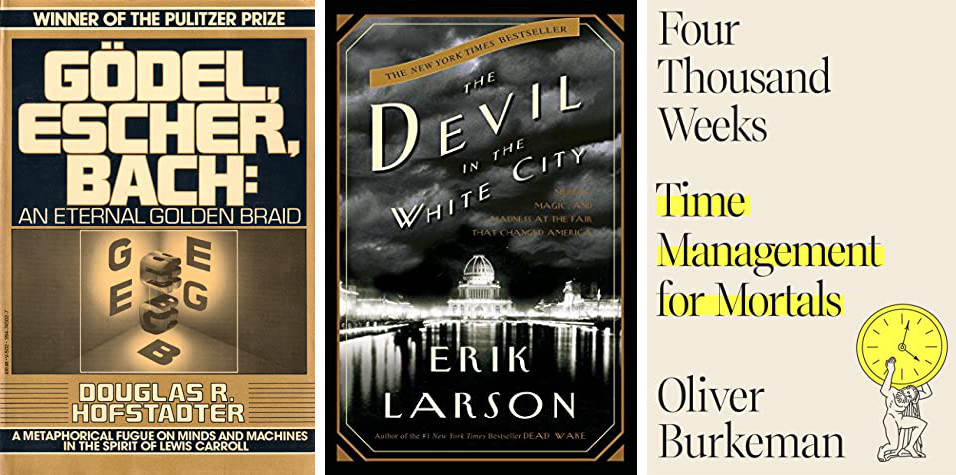Previous book lists: 2020, 2019, 2018. My Reading List has a full log of the books I read.
Fiction

- The Overstory (Richard Powers)
The Overstory is a story about trees, the people that endeavor to protect them, and how rooted human culture is in nature (pun intended). The story is told from half a dozen or so interlocking narratives in a masterful way. It’s a poignant novel that is well worth it’s 500 pages, and is one of the few pieces of “modern literature” that I’ve read and thoroughly enjoyed.
- The Broken Earth Trilogy (N.K. Jemisin)
I’m cheating a bit to list a trilogy as a “favorite book”, but The Broken Earth trilogy is best read as a trilogy – my favorite entry was the last in the sequence, but this was in large part because the first two books set it up to close with a strong ending.
Taking a step back… Impressively, each entry in The Broken Earth won a Hugo award. That’s quite a feat, and yet I still wasn’t sure if I’d enjoy these books, since on the surface they appear to be fantasy novels. However, I added them to my reading list after listening to this great Ezra Klein interview of N.K. Jemisin. Simply put, the world building in The Broken Earth was excellent enough to keep my interest, and the plot builds over the three novels to be well worth the time investment.
I wrote this earlier in the year after reading the first book, “The Fifth Season”:
The world building in this book is first-rate. I found myself taking notes on the various ways that its society is structured, and how characters make sense of the world with their own forms of science.
Nominally, this is a more “fantasy” book, in that magic exists and the world is more grimy than chrome. However, it feels like there might be more going on than is being described on the surface level, which makes me excited to read the second and third entries of the trilogy.
After reading the second and third books, this assessment was correct (no spoilers!). Each book was better than the last, and the trilogy completed in a really satisfying way.
- The Rampart Trilogy Trilogy (M.R. Carey)
So, I’m going to continue to cheat and list another trilogy as a “favorite book”. This one feels like less of a cheat though, since The Rampart Trilogy – even more than The Broken Earth – feels like a single book split into three parts for publishing reasons. I wrote this about the first entry, The Book of Koli:
Within 20 pages of this book, I was hooked. It’s set in a post-apocalyptic Britain, where (likely due to runaway genetic modification) all non-human life – from trees to forrest animals – has become intensely hostile and aggressive. Excellent storytelling, in-world linguistic tricks, and Carey’s writing style makes this a page turner.
The Rampart Triology isn’t quite as tight a trilogy as The Broken Earth, but it explores some interesting concepts – most notably, the rediscovery of technology after civilization’s collapse – and is constructed in a charming way.
Non-Fiction

- Gödel, Escher, Bach (Douglas R. Hofstadter)
GEB is a classic. I thought it would be a dense, frustrating read, but it was actually a delight: Hofstadter’s writing is technical, but contains is absolutely overflowing with whimsy. I wrote a few posts this year about GEB:
- A Hand-wavy Proof for the Infinitude of Prime Numbers
- Three Layers of Information
- Two Types of Infinity
… as well as a full review.
- The Devil in the White City (Erik Larson)
This is a book that is dually about the 1893 “World’s Columbian Exposition” (a.k.a “World’s Fair”) and the infamous Chicago-based serial killer, H. H. Holmes. The time period surrounding the Chicago Exposition is fascinating; it was a truly dynamic time in American History. The fair featured the first public demonstrations of alternating current, the automatic dishwasher, and (of all things) the vertical filing system. The exposition itself was planned by elite American architects, who were attempting to outshine the recent Paris World’s Fair – which had featured the debut of the Eiffel Tower.
One comes away from this book feeling that it’s a miracle that the exhibition opened at all – much less that it grew to be a major success for Chicago, drawing in record breaking numbers of visitors. The exhibition was hosted in Jackson Park, which prior to development was “a desolate, undeveloped waste on the lakeshore”. Furthermore, all the plans for the buildings in the exhibition had to be massively scaled back. They’d originally been planned to be made out of brick and stone, but instead were constructed from (flamable) wooden frames covered by “staff, a resilient mixture of plaster and jute that could be molded into columns and statuary and spread over wood frames to provide the illusion of stone.”
While the bits about H. H. Holmes were interesting, I could have done without them. It felt like a bit of True Crime bait to keep the reader interested in the core drama of competing architects and construction logistics. Maybe it’s just me, but long-form discussions of logistics are enough to hold my attention.
Nevertheless, this was an enjoyable read, and I absorbed a surprising amount of 19th century American history trivia while reading.
- Four Thousand Weeks (Oliver Burkeman)
Four Thousand Weeks is an undeniably “2021” book. The pandemic renewed discussions about burnout, the extractive nature of our economy, and the futility of chasing the feeling of “making it”. Four Thousand Weeks subversively suggests to “stop trying so hard”:
Nobody in the history of humanity has ever achieved “work-life balance,” whatever that might be, and you certainly won’t get there by copying the “six things successful people do before 7:00 a.m.” The day will never arrive when you finally have everything under control[.] … Let’s start by admitting defeat: none of this is ever going to happen. But you know what? That’s excellent news.
It’s not an explicitly “self help” book; it makes only a few concrete suggestions, and none of them are “life hacks”. Though, nor is it a philosophical text or social commentary – it lives somewhere in the intersection of these genres.
Note the curious suggestion, in the term “life hack,” that your life is best thought of as some kind of faulty contraption, in need of modification so as to stop it from performing suboptimally.
Unlike almost every book I’ve read in the past several years, after reading Four Thousand Weeks, I immediately wanted to flip back to the beginning and read through it again. As a final note:
[T]here’s a sense in which every moment of life is a “last time.” It arrives; you’ll never get it again—and once it’s passed, your remaining supply of moments will be one smaller than before. To treat all these moments solely as stepping-stones to some future moment is to demonstrate a level of obliviousness to our real situation that would be jaw-dropping if it weren’t for the fact that we all do it, all the time.
Honorable Mentions

- Database Internals (Alex Petrov)
I had a lot of fun reading Database Internals. Distributed systems, and databases in particular, is one of my favorite topics, and so this was a fun retracing of the state of the field. This book covers much of the same ground as Designing Data Intensive Applications, which was one of my favorite books I read in 2019.
I also wrote a post this year on BTrees, which was lifted heavily from the contents of Database Internals.
- Recursion (Blake Crouch)
A thrilling sci-fi novel based on an unconventional form of time travel. A hundred or so pages into this, I though I knew what was going to happen, but this book zags when you expect it to zig. It thoroughly explores its premise, in a way that few books are able to do in such a limited number of pages. This book is definitely aimed at sci-fi thriller fans, as it expects you to “fill in the blanks” in some passages, but as a result it skips over common tropes and delivers a nuanced story.
- The City & The City (China Miéville)
A Kafkaesque detective story set in a city divided in two, though only in the minds of each city’s citizens. The book reads as a police procedural, but the plot isn’t as interesting as Miéville’s development of the divided cities. This was an impressive book to read, though it’s core plot wasn’t particularly gripping.
- The Beginning of Infinity (David Deutsch)
This is another book, like GEB, that gets frequently tossed around in folks' recommendations lists. I’m struggling to describe what this book is actually about. In some sense, it’s about the process of knowledge creation; it discusses the unreasonable effectiveness of explanatory knowledge, and the pitfalls of empiricism. It’s also a manifesto for the future of human endeavor, arguing against all forms of short-sighted “parochialism”.
There’s a lot more in this book that makes it hard to pin down: it discusses the multiverse, aesthetics, Godel’s incompleteness theorem, memetic evolution, the rise and fall of civilizations, and so on. All of these get tied to various definitions of “the beginning of infinity”, which I’d loosely define as “catalysts for the compounding creation of knowledge”.
Deutsch’s position is staunchly on the side of technical optimism. So, to end on an optimistic note: "[E]verything that is not forbidden by laws of nature is achievable, given the right knowledge. ‘Problems are soluble.’".
Book covers from GoodReads. Cover Art: Vertical-Horizontal Composition (Sophie Taeuber-Arp, 1928)